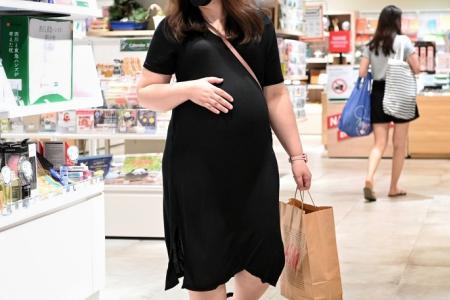Vaccine to protect babies from viral respiratory infection
From Nov 1, pregnant women can get a vaccine shot to protect infants against a viral respiratory infection with symptoms like cough and fever, which can then lead to more serious conditions like pneumonia.
The Abrysvo vaccine protects infants – who are highly susceptible to respiratory syncytial virus (RSV) – against lower respiratory tract disease caused by the contagious virus, until they are six months old.
RSV symptoms include cough, fever and body aches, and can result in pneumonia and bronchiolitis – an inflammation of the small airways deep inside the lungs.
The jab can be given to women who are between 32 and 36 weeks pregnant, and the antibodies will be passed to their babies.
Abrysvo is manufactured by pharmaceutical giant Pfizer, and was approved by the Health Sciences Authority on July 23.
It is the first such vaccine to be approved for pregnant women in Singapore.
The vaccine will be available at private GP clinics and hospitals, including KK Women’s and Children’s Hospital.
In response to queries, KKH did not say how much the vaccine will cost, but only that it would be “made affordable”.
Abrysvo is administered in a single dose, through an injection to a muscle in the arm.
Experts recommend that mums-to-be get the vaccine because infants can be susceptible to the virus.
Contracting RSV during infancy may increase the risk of long-term consequences such as asthma and wheezing, said Dr Mohana Rajakulendran, a consultant paediatrician at the Petite Practice clinic in Joo Chiat.
Professor Anne Goh, a senior consultant of respiratory medicine service at KKH, said: “RSV infection is a common cause of bronchiolitis and pneumonia in early infancy, resulting in hospitalisation.
“So, if fewer babies are getting infected or have milder disease, they will not need hospitalisation or frequent visits to the doctor.”
While the vaccine is administered mainly to protect newborn infants, it can also protect pregnant women against RSV, added Prof Goh.
RSV is the leading cause of acute lower respiratory tract infection in children under five globally, and results in 3 million hospitalisations and 60,000 deaths annually, according to a study published in the medical journal Lancet.
In Singapore, the virus accounts for more than 3 per cent of the hospitalisations of infants under six months, a study published in the US Centres for Disease Control and Prevention found.
Some babies of mums who received the vaccine were observed to have slightly lower weights at birth and a slight increased risk of jaundice, said Dr Mohana. However, all babies remained healthy after delivery, and did not experience major complications, she added.
Jaundice is a common condition in newborns, where their skin and eyes have a yellow tinge.
Possible side effects which will be experienced by mothers who get vaccinated are usually mild, and can include headaches, muscle aches and soreness, redness or swelling at the injection site, said Prof Goh.
But those with a history of severe allergic reactions should not take the vaccine, said Prof Tan Hak Koon, chairman of the obstetrics and gynaecology division at KKH.
Severe reactions include anaphylaxis - a life-threatening reaction that often leads to respiratory collapse.
Those who are allergic to ingredients in the vaccine should also refrain from taking it, added Prof Tan.
Mothers who have a history of pre-term deliveries, high blood pressure and pre-eclampsia should also be more cautious with taking the vaccine, said Dr Mohana.
There were more vaccinated mothers who got such conditions during clinical trials but the number was statistically insignificant, she added. However, mothers who have these conditions should exercise more caution.
Patients with minor acute illnesses like a cold can still go and get the vaccine, added Prof Tan but those who suffer from moderately serious to severe illnesses should hold off until their health improves.
Before getting the vaccine, mums-to-be should consult their obstetricians, said the doctors.
During clinical trials, Abrysvo demonstrated a 91.1 per cent effectiveness in preventing severe lower respiratory tract disease caused by RSV in infants in the first 90 days after birth, when administered to mothers when they were between 32 and 36 weeks pregnant.
In the first 180 days of birth, the vaccine demonstrated a 76.5 per cent effectiveness, said Pfizer.
Abrysvo has also been approved for those aged 60 and older. It is the second RSV vaccine made available in Singapore for the age group. GSK vaccine Arexvy was the first to be approved by Singapore authorities in May 2024.
The Health Ministry said the vaccine is not included in immunisations schedules. It will continue to monitor data on the effectiveness and possible rare serious adverse events of the vaccine over time, it added.
Get The New Paper on your phone with the free TNP app. Download from the Apple App Store or Google Play Store now

